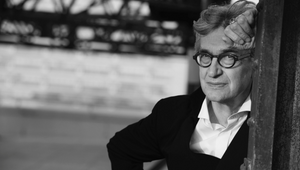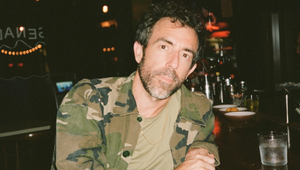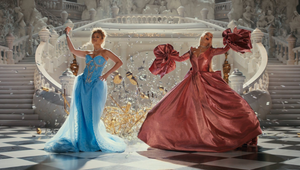
Samona Olanipekun: “I’m Trying To Organise The Chaos”

Photo credit: Bradley Lloyd-Barnes
“It feels like a completely natural evolution for me”, says Samona Olanipekun. “It seemed like every other project I was working on had RadicalMedia involved, and they always make it so easy. No egos, just people passionate about what we’re all making”.
Having recently signed to RadicalMedia, Samona is taking an opportunity to reflect. “I’ve definitely taken a kind of D.I.Y. approach to get here”, he explains. “As well as directing I’ve worked a lot as a producer, and although I’m trying to wear that hat less it’s a good perspective to be able to draw on. When I start thinking about a project I’m immediately thinking about exactly how we can get this done, and that helps things run smoothly.”
Most recently, that approach was applied to a powerful music video for Jorja Smith’s Rose Rouge. Viewing the Black Lives Matter movement through a lens of empowerment and celebration, the film draws on footage captured on mobile phones at protests around the world.
Above: “We made the film for Rose Rouge around the time that BLM was dominating the conversation”, says Samona, “and I wanted to put a spotlight on this global outpouring of emotion and expression in a positive way”. The music video for Rose Rouge was created in collaboration with Object & Animal.
“There’s a lot of negativity in the world, and often for good reason”, says Samona. “But when I was looking at the Black Lives Matter protests, I was inspired. It showed people still believe in a better world, and I wanted to share some positivity from this moment the whole planet seemed to be sharing. I think when you try and organise what might seem like chaos, you can see something beautiful.”
Whilst the film is undeniably uplifting, the found-footage approach to much of the content allows the film to retain a sense of realism. “I’ve always been fascinated by the idea that we all have these films in our camera rolls that maybe get posted once or twice and then they just die”, notes Samona. “I wanted to breathe life into these films and applying that idea to a proper moment in history like BLM was so exciting and rewarding. Jorja actually got in touch on socials and told me how much she loved it! When that happens you know you’ve hit on something good”.
Above: Similarly to Rose Rouge, Samona’s film for Earth Day 2020 draws on found footage to powerful and evocative effect.
Despite how fresh the Rose Rouge video feels, it’s not the first time the director has worked with the concept of found footage. For Earth Day 2020, Samona was tasked with creating a film that celebrated all the planet had to offer - despite the fact that, when the video went out in April, we had all just been asked to isolate within our own walls.
In defiance of the bleak global conditions, the Earth Day film is an uplifting, dopamine-filled ode to a better future in the post-lockdown era. “Looking back from where we are now, beginning to slowly emerge from our various stages of lockdown, I wouldn’t change many things about it”, Samona says. “I think we are emerging into the new world with new perspectives.
“There’s not going to be any going back to the way things used to be pre-pandemic, I think that’s pretty clear. And what the Earth Day film is driving at isn’t about just waiting to go back to exactly how things were, it’s going into the new world refreshed and excited to make something beautiful from it”.
For Samona, exploring powerful themes through film is becoming a habit. In 2018, the director created the short film ‘Kindred’, as part of the Barbican’s ‘The Art of Change’ season. Taking the concept of ‘globalisation’ as a starting point, Samona created a film which evokes feelings of home and belonging.
Above: Whilst filming Kindred, created as part of the Barbican’s ‘The Art of Change’ season, Samona reflected on concepts of globalisation and home.
The story of Kindred’s production is underpinned by another seismic geopolitical event. “I was really wrestling with the images we were seeing in regards to the migrant crisis. I had an innate urge to make sense of it.”, says Samona. “In particular the scale of what people were willing to risk, the dangers they were ready to confront, in order to provide a safe life for their families. Whereas I think a lot of the media coverage can be dehumanising, I wanted to engage with the emotional heart of that epic journey that so many people were looking to make”.
The film also presents a clash between an increasingly connected world and maintaining one’s own sense of home. In particular, is home the place you’re from, or the place you want to be?
“For my parents, when they think of home I’m sure they would think of Nigeria”, says Samona. “As for myself, it’s hard to say. I grew up in Coventry and now I live in London, but of course my family has their roots in Nigeria. I think home is this fluid term, and I hope understanding that can begin a conversation that can improve the way we talk about refugees”.
For Samona, defining ‘home’ is a thread he intends to trace into future projects, both short and longform.
My first-ever feature film, Youth is currently in early development”, he explains. “It’s a semi-autobiographical film set in the midlands against the backdrop of the country’s oldest ball game. I want to ask some questions about Britishness, through the lens of maybe an underrepresented part of our society. There seems to be a bit of tension about our national identity at the moment, and I wanted to offer a nuanced view of Britishness”.
Despite grappling with such an active political issue, Samona was never tempted to make a documentary. “I was inspired by Werner Herzog’s description of the ‘ecstatic truth’ in art”, he says. “It’s this theory that, at times, you can tell stories in art which are not true or grounded in our exact reality but use those to illuminate a wider truth. In that sense, art - whether that be music, literature, cinema, whatever - can be more real than reality. It speaks to a deeper, more profound, and inexplicable truth. That whole concept fascinates me, and Youth is the first stage of me exploring that theory.”
A curiosity for, and often a desire to change, the world connects much of Samona’s work. According to the director, that thread can be traced back to a love of science fiction.
“Sci-Fi to me is a chance to reimagine the future”, says Samona. “It’s the ultimate ‘what if?’ question. And you know, if history shows us one thing it’s that change is the only constant, and the future is totally unpredictable. So why not experiment with science fiction? It might not stay fiction for long.”
An as-yet-unnamed project, described by Samona as ‘grounded Sci-Fi’, is set to deal with technology’s impact on our lives in a way which reflects the way we live today. “I was inspired by this book called Be More Pirate by Sam Conniff Allende”, notes Samona. “Essentially the argument goes that a pirate is someone who sets up and lives by their own laws. At a time where it is becoming more and more obvious that we can’t trust the big tech companies with their own inventions, that’s an appealing logic.
“Thinking about how the internet has grown over the past decade or so, it’s the actions of ‘pirates’ that have determined the culture we live in right now. Think about how we share music and video so instantaneously, for example. Maybe the best hope for the future lies with us all being more pirate”.
For the director, the opportunity to tackle larger and more complex issues through film is part of the appeal of working on more long-form projects. “That extra time and space is invaluable”, he argues. “We live in a world today where there isn’t space for curiosity and nuance, you look on Twitter and everything is absolute and defined. But that’s not the real world. It’s fake. In taking away that time and space we take away our capacity for challenging things, questioning, and exploring a theme. That’s what I want to do with my long-form work and I think the two projects I have in the pipeline right will be good examples”.
Outside of film, Samona’s interests are grounded in more earthly territory. “One of the things I’m finding a lot of joy in right now is that my brother, Ollie, has started a bird watching club called Flock Together”, he explains. “I never realised how much green space there is in London, there’s so much nature. Get yourself down to Hackney Marshes and see what you can find, it’s a perfect antidote to lockdown!”.
In an industry coming to terms with its new normal, Samona has found a fresh lease of life under RadicalMedia’s wing. “I want to start working on a variety of projects; stuff that really has storytelling at its heart and I’m buzzing to go on that journey”, says the director.
Whereas lockdown has put many ambitions on hold, Samona’s is a career only beginning to take flight.
Samona is represented by RadicalMedia for commercials, music videos and branded content and Peach House for Film & TV.













